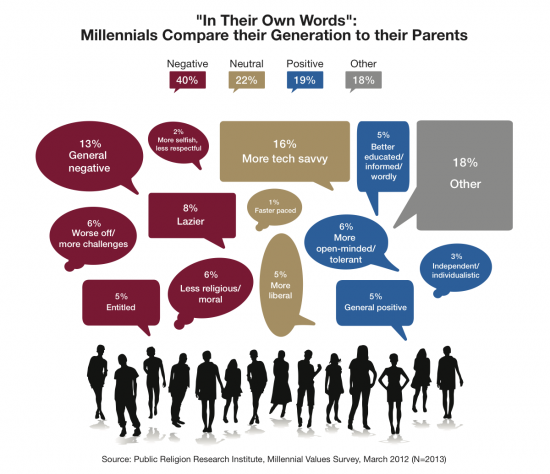Well, there you have it. How the millenials define themselves in comparison to their parents. Does it look right or ring true to you?
In case you are not a visual learner, you can find the same stuff here in print form. Read it up and tell me the answer to the great Lutheran question: What does this mean? Download the PDF and read it all here.
If you cannot wait, I have cut to the chase the put in the info on their religious views and values. Read it below:
Younger Millennials report significant levels of movement from the religious affiliation of their childhood, mostly toward identifying as religiously unaffiliated. While only 11% of Millennials were religiously unaffiliated in childhood, one-quarter (25%) currently identify as unaffiliated, a 14-point increase. Catholics and white mainline Protestants saw the largest net losses due to Millennials’ movement away from their childhood religious affiliation.
- Today, college-age Millennials are more likely than the general population to be religiously unaffiliated. They are less likely than the general population to identify as white evangelical Protestant or white mainline Protestant.
- Millennials also hold less traditional or orthodox religious beliefs. Fewer than one-quarter (23%) believe that the Bible is the word of God and should be taken literally, word for word. About 1-in-4 (26%) believe Bible is the word of God, but that not everything in the Bible should be taken literally. Roughly 4-in-10 (37%) say that the Bible is a book written by men and is not the word of God.

1 comment:
Self esteem movement was a BIG mistake. It basically just flatters our sinful nature.
"The Dunning–Kruger effect is a cognitive bias in which unskilled individuals suffer from illusory superiority, mistakenly rating their ability much higher than average. This bias is attributed to a metacognitive inability of the unskilled to recognize their mistakes.
Actual competence may weaken self-confidence, as competent individuals may falsely assume that others have an equivalent understanding. As Kruger and Dunning conclude, "the miscalibration of the incompetent stems from an error about the self, whereas the miscalibration of the highly competent stems from an error about others"
Post a Comment